Pan Am Games mixed doubles gold medallists Toby Ng and Grace Gao, recently separated from their coach Kim Dong Moon, spoke to Badzine during a brief training visit to Korea earlier this month, a stop on the way to a four-week tour of some of the biggest badminton tournaments in Asia.
By Don Hearn, Badzine Correspondent in Korea. Photos: Yves Lacroix for Badmintonphoto, and Don Hearn
Toby and Grace have risen to as high as 16th in the world under the tutelage of the great Kim Dong Moon. Currently at #27, they are still the top pair in the hemisphere and are well on their way to qualifying for the London Olympics.
The two had a recent setback when Kim Dong Moon left Calgary to join his wife and former mixed partner Ra Kyung Min who, with their children, had moved back to Korea last February when she was offered the job as head coach of one of Korea’s top women’s badminton teams.
Now preparing to take on teaching duties at his alma mater Wonkwang University, Kim Dong Moon hosted his Canadian protégés when they came to Korea in early November, to train at Wonkwang, home to one of Korea’s top men’s university badminton teams.
Toby and Grace took some time after training to speak to Badzine about both badminton and Korea, about what they’ve learned and how they will apply it as their careers turn this next corner.
Badzine International: You are in Korea to train for the next month of Asian events?
Toby Ng: Yes, we were originally thinking of coming here for two or three weeks of training but we made the decision during the Pan Am Games to stay a while, play the Puerto Rico International, and also rest up a bit, rather than come here with an injury.
Grace Gao: Yes, the Canadian team at the Pan Am Games had a whole team of physiotherapists so the badminton team got assigned one physio just for our team and travelling with us so we utilized that a lot. It was great.
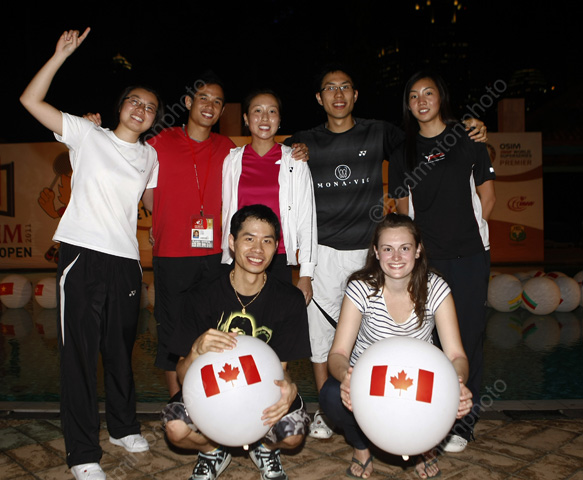
Team Canada members at the 2011 Indonesia Open. Left to right, Grace Gao, Adrian Liu, Joycelyn Ko, Derrick Ng, Michelle Li, (in front) Toby Ng, Alex Bruce © Yves Lacroix for Badmintonphoto
BZI: Does Canada have an official national team now?
Ng: Yes, it was actually started in January but officially the team was announced in May. The original contract was that every national team member had to be Yonex but then they started to have these exceptions, but Yonex will provide some bonuses to only the Yonex-sponsored players.
BZI: But there is still a significant difference from the national team in Korea, for example?
Gao: Oh yes. Here they have a facility where all the national team players train, whereas in Canada, we just train out of our own clubs. That’s a big difference. We have training camps, but once a year.
BZI: What is it like now to be living overseas from your coach?
Ng: It is tough. I’m training now at ClearOne [in British Columbia] where I used to train and they have their own academy. In a way it’s good because now I have the freedom to digest all the things I’ve learned over the past few years but at the same time, sometimes I don’t feel I have the flexibility to train exactly the way I want to.
It’s a program and they run the program and everybody follows it but sometimes, it just isn’t catering to what I need. An example is that I might want to practice the defense Kim was showing us at the front, the net kills, and they will say okay, we’ll just get three people to smash at you. So it’s kind of the same, it feels similar, but at the same time, it’s not exactly what I want and in the end, I can develop the wrong habits again.
Gao: Ever since Kim left, we have been having tournaments so there hasn’t been much more than a week there. I went back home to Calgary for one week and then after that, I went to Vancouver to train with my partners at ClearOne.
BZI: Your women’s doubles partner, Joycelyn Ko, is from Ontario but she also trains in Vancouver then?
Gao: Yes, she moved out there when the ClearOne programme started up and she has been training there for about two years. After the senior nationals, she and I got talking about our goals and we had similar goals so we got together.
BZI: It seems that a lot of Canadians have ended up moving their training base to Denmark and players from other countries have ended up in places like Malaysia and others. Have you ever thought it would be feasible to have a training base in Korea?
Gao: Well for us, in the beginning, we had Kim Dong Moon in Calgary so it was easier for Toby to move to Calgary so it was different from the people who have gone overseas to train because it was never a case of us moving to Korea to train with Kim. For us, each time we’ve come to Korea, it has been with Kim and has been more for the sparring but we’ve already had a coach of the calibre of Kim Dong Moon in Canada.
BZI: But for now, with Kim having moved back to Korea, is moving here yourself even something you could consider?
Ng: It’s tough. I really appreciate learning so much from Kim. I still haven’t been able to digest even half of what we’ve learned but if I could fully digest everything, then I guess we’ll see where we stand.
The other thing is that I think it’s the greatest thing if you can develop in your own country, which is more of an influence to all the upcoming players.
Michelle [Li], for example, she goes around to train but she just broke into the world’s top 25 in women’s singles this week and she trains at Lee’s [in Markham, Ontario] so it’s good to see that you can get good just training with the right people.
BZI: So achieving your goals without actually migrating is something that’s personally important to you?
Ng: Yes, but it’s also a case where not everyone can really afford to go overseas to train. It’s just not a viable option for everyone. So if you can see someone who trains somewhere in Canada but can compete with the world, it’s good for everyone.
BZI: Would getting funding from Canadian sources also be more difficult if you trained overseas?
Gao: It might be but there are also local tournaments that you have to play to get funding and if you train overseas, you would have to fly back to Canada to play them and that is expensive, too, compared to what we do, which is train in Canada and just fly from province to province.
Ng: Also, if you are living in Denmark or somewhere, then you’d have to play the international tournaments in that area. And as a Canadian, living in Europe and winning the International Challenges there and winning the ones in the Pan Am region, it’s totally different.
So there is a strategic advantage to living in Canada because it’s a little easier to win the titles that will then qualify you for funding.
BZI: You have trained with some professional and university teams here in Korea. How does the training compare with what you’ve had back home?
Ng: Well, it is quite different. At home, if we have a training session at 7:30, we all show up at about 7:30 and start warming up. Here, they’ll have a session at 10 and they show up at 9:30 and do a warmup all together.
I think a big difference is that here, everybody lives in the same area, together in a dormitory but in Canada, it might take me 5 minutes to get to the gym and it might take someone else an hour.
Overall, I think it brings a unity to the group, though, whereas at home, if someone shows up late, and some are early and the warm-up is casual and the amount of training is just not the same.
The players here can be a lot more serious, too. This morning their Chinese coach was teaching them something and even though there was a language barrier, the players were all taking it very seriously and trying their best to digest what he was teaching them.
BZI: Grace, was it just coincidence that you ended up in Calgary, the one place in Canada where two former international greats have coached?
Gao: Yes, I moved to Canada when I was 14. My Dad is a geologist and Calgary is more of an oil and gas town so Dad moved there because of his career and the family with him.
It just so happened that Kim Dong Moon moved to Calgary and coached there. I had also trained with Ardy Wiranata in Calgary during my junior years.
We didn’t plan it that way. I played badminton when I lived in Beijing, but just casually. Everyone in China plays.
I went to a couple of hours of evening training classes three times a week. Shichahai Sports School is where I trained out of. But I wasn’t on even a school team, I just played in my leisure time. When I really got serious about badminton was after I moved to Canada.
BZI: For many, winning gold for your country at a multisport event is a big deal. Would you say that the Pan Am Games gold medal was your biggest win?
Ng: I guess so but it was just a good victory, even just at the moment, because we had just lost to Halim and Eva in Brazil a few weeks before. It almost got to the point where we were kind of getting nervous and we thought we should change our tactics and I felt that we were worrying a little too much.
Gao: Every time we’d played them, it was always really close. It always went to three games. Winning the Pan Am Games was reassuring us that we should stick to what we’ve been taught.
It was tough because Kim wasn’t there right before and during and we really had to figure things out.
Ng: We actually got to talk to him on Skype and even do video analysis that way.
BZI: You are playing a lot of Pan Am tournaments but for top level fields you’ve had the two Grand Prix’s in July and a couple of trips to Asia. Are you getting enough exposure to top pairs?
Ng: There are phases in the calendar. The Pan Am tournaments are abundant in the calendar from September to November and at the end of November you can make that choice whether you want to play the circuit in Europe or what we’ve done, which is come to Asia because we really wanted to just play the big ones, especially for the Olympic year.
BZI: Now, in the China Open, you are up against Shoji Sato and Shizuka Matsuo, then if you win, Zhang Nan and Zhao Yunlei. What’s the outlook?
Ng: Oh there was a re-draw? Well, we have to win one match first, I guess. It’s good though. The best pair we’ve played so far is He Hanbin and Yu Yang. The thing about playing the best teams is that you can really see the gap, you know? What is the endpoint, or how good do you really have to be or what are you really chasing?
For us, for a long time, we really had no idea how good the best teams are. I mean, you can watch a video but until you actually get a chance to play them, you don’t really know how fast they are or how hard they smash.
BZI: Now, you know that your coach is world famous and that badminton isn’t quite in the obscurity here in Korea that it is in back in Canada but is the recognition he gets in his home country what you would have expected?
Ng: Well, I didn’t really go in with expectations but it was kind of funny when we went into a Yonex shop here in Iksan and the employee didn’t know who he was. We sometimes like to try it out, saying ‘well do you know who this is?’ but Kim Dong Moon is pretty humble.
But we’ve also been to a restaurant of a friend of his and he has a Kim Dong Moon-autographed racquet and lots of pictures on the wall because he still is someone famous.
BZI: For a lot of young people, Korea is also famous for it’s popular culture. Is coming here interesting for that reason for either of you?
Ng: Well, when I was in high school, I was really into Korean pop music. It went in phases. I also took up break-dancing and I met a Korean guy who was really good and Korea started to be a very big underground break-dancing scene around 2003 to 2005.
So it’s weird because a lot of the major influences in a couple of the things that I really liked to do just happened to be Korean so I really have a lot of respect for the country.
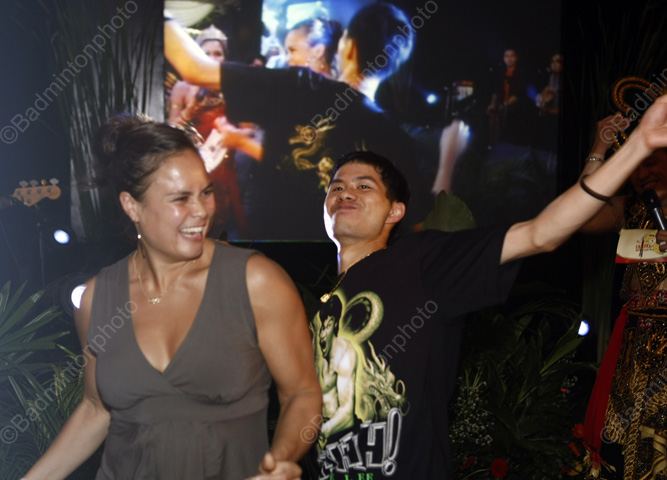
Lotte Jonathans (NED) and Toby Ng at the 2011 Indonesia Open Welcome Dinner © Yves Lacroix for Badmintonphoto
Actually, at the Indonesia Open welcome dinner, they were giving away as draw prizes these Samsung Galaxy Tabs. They ran out of names for the draw and so they asked people to get up on stage and they made us do some Indonesian dance interpretation. Since we were doing it for a Galaxy Tab, I decided to volunteer and I started break-dancing halfway through – I came out of retirement.
I had this final against Lotte Jonathans and I lost. I don’t feel I should have lost. The audience had to cheer to decide the winner. I didn’t get the Galaxy Tab.
I kinda thought that the BWF people who were cheering were secretly reacting to the skirt rule that had just died.
That was probably my most embarrassing moment this year. I can’t even watch the video that Grace took.
BZI: You are clearly the top mixed pair from the Pan Am region. Is there a certain ranking or another goal that you are after?
Ng: We’re hoping we can have the best result in the Olympics for a mixed pair from Canada so if we can do that, that will be awesome.
Badzine has now also published a sequel to this article, a conversation with Dr. Kim Dong Moon.
For updates on Toby and Grace’s journey to the London Olympics and more, check out Toby Ng’s blog.
![SPOTLIGHT – Korea’s Canadian Connection Pan Am Games mixed doubles gold medallists Toby Ng and Grace Gao, recently separated from their coach Kim Dong Moon, spoke to Badzine during a brief training visit to Korea […]](https://www.badzine.net/wp-content/uploads/Newsflash-thumbnail.png)
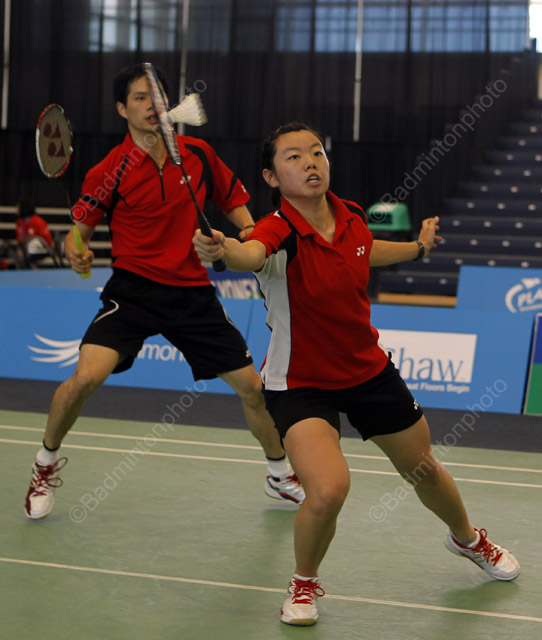

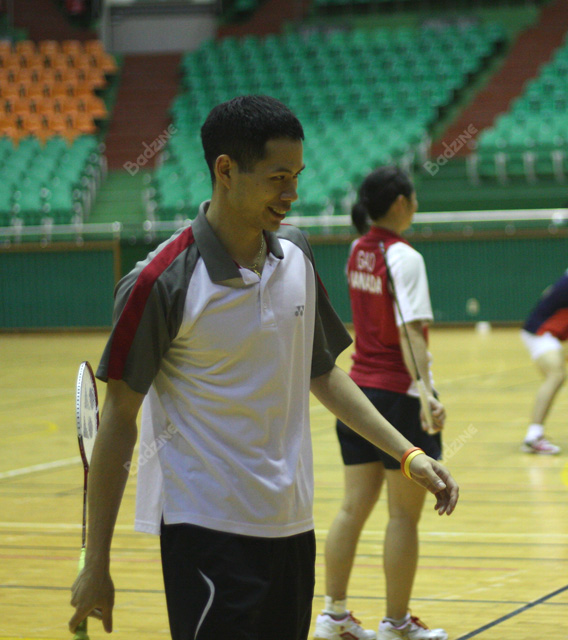
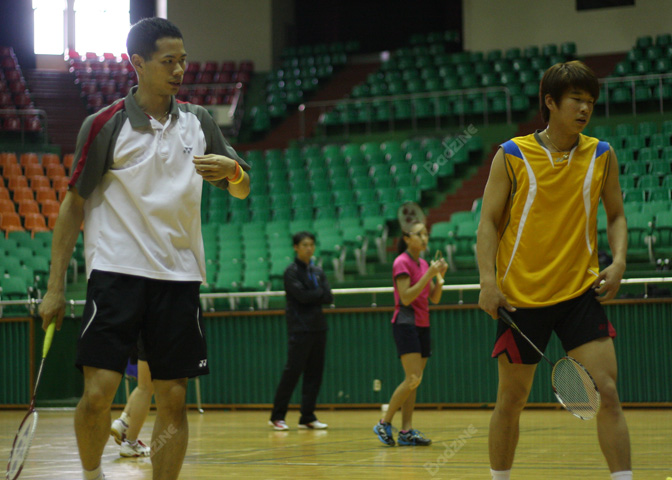
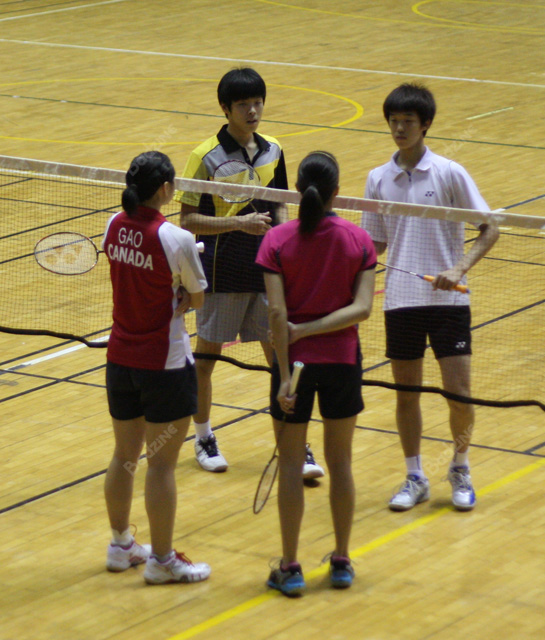
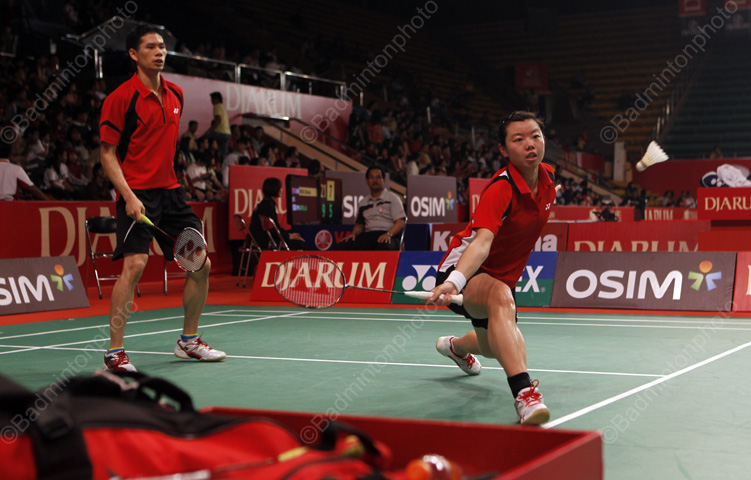

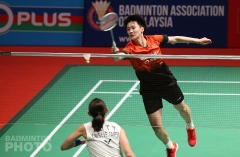
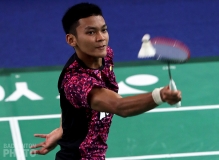
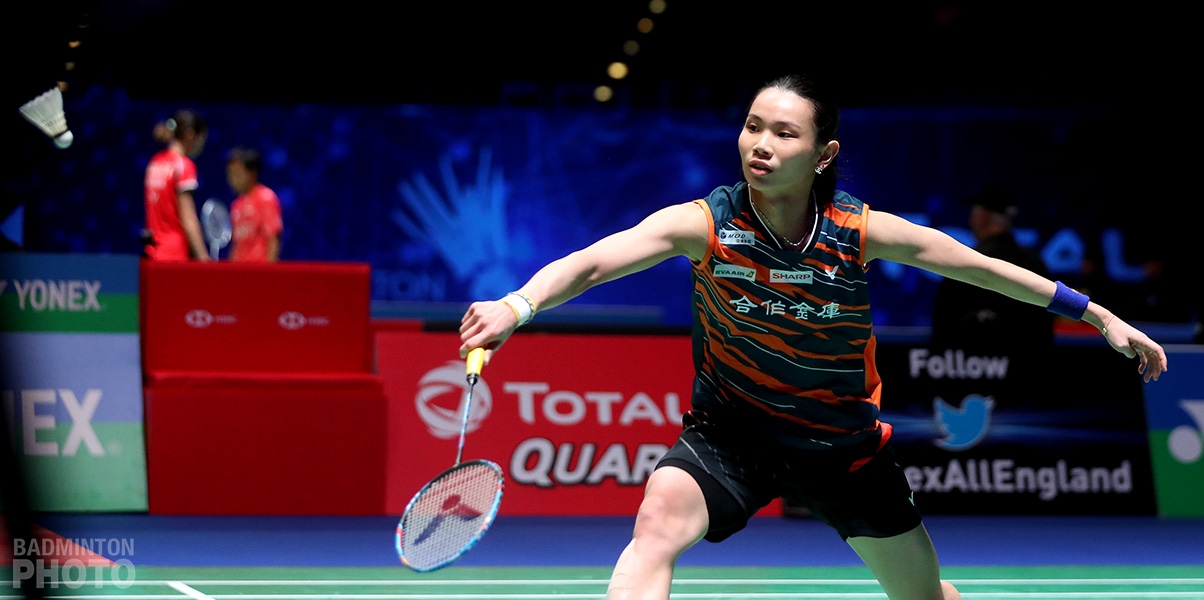
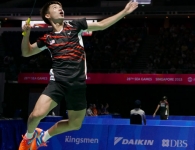
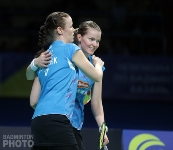
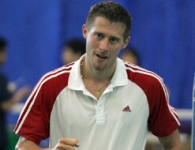
Leave a Reply